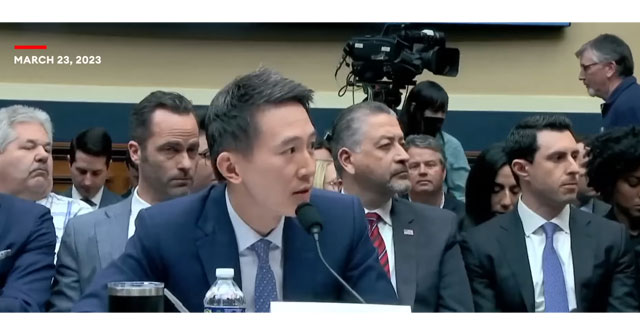
TikTok CEO US Congress hearing: Five key takeaways from Shou Chew’s testimonial


On Thursday, March 23, TikTok chief executive Shou Chew attended a six-hour hearing session in front of the US Congress, attempting to take on questions regarding the safety, content moderation and alleged espionage activities perpetrated by the app’s holding company, Bytedance. Through the session, the executive was asked about the company’s links to China’s government, how deeply the app is linked to Bytedance itself, and decisions taken by TikTok executives in terms of data privacy, child safety, data collection and other issues. These are the key takeaways from the hearing.
Questions on China government ties receive few clarities
One recurring theme of the TikTok CEO’s US Congress hearing were affirmed voices from US legislators against the viral short video application, which is presently one of the most popular smartphone applications around the world. For instance, Republican Cathy McMorris Rodgers underlined the numerous China links of key Bytedance personnel, as well as citing previous media reports that revealed internal TiKTok memos regarding directing the platform towards “the correct political direction”.

Rodgers further went on to add that the app “should be banned” in the US.
Following her, fellow Republican Kathryn Cammack raised questions on TikTok’s lack of filtering of violent content, and further alleged issues with TikTok’s collection of user data. Raising further questions on the hierarchy, Cammack added that Bytedance, TikTok’s parent company, “has gone out of their way to hide and airbrush corporate structure ties to the CCP (Chinese Communist Party), the company’s founder, and their activities.”
Cammack further added that Bytedance’s website “has been scrubbed,” and that webpages of the company were “archived but later deleted.”

“Makes you kind of wonder why,” she added.
Chew’s responses to questions around TikTok’s ties with China’s government, however, remained entwined in carefully chosen words, without the direct “yes” or “no” responses that US legislators sought. However, Chew was quick to highlight in his opening remarks that TikTok “is not available” in China, that the company is headquartered in Los Angeles and Singapore, and has 7,000 employees in the US.
He further added that there was no evidence of Chinese government having access to US user data. “They have never asked it, we never provided it,” he said. In response, US Democrat Anna Eshoo replied, saying, “I actually find that preposterous.”

Legislators underline the app’s impact on teens and violence
The second most important theme of the TikTok CEO US Congress hearing was around the efforts that the service takes towards user safety, especially that of teenagers and underage users. Republican Cammack played a clip from the platform, showing a revolver and bullets, before tearing into Chew.
“This video has been up for 41 days, and it is a direct threat to the chairwoman of this committee. Yet, it still remains on the platform — and you expect us to believe that you are capable of maintaining the data security and privacy of 150 million Americans, when you can’t even protect the people in this room? I think that is a blatant display of how vulnerable people who use TikTok are,” she said.

Even more notable through the hearing was Republican Gus Bilirakis’ allegations that TikTok’s content moderations are shallow, and its algorithms are tuned in a way that promotes notions of self-harm among teens if that is how they feel. “Your technology is literally leading to death,” he said.
Republican Bob Latta further highlighted a case when a 10-year-old user of the app was directed towards viewing videos of a “blackout challenge”, leading to the death of the child.
Chew, in response, underlined safety tactics that the company has adopted in order to promote underage usage safety and guidelines, including setting a 60-minute usage timer for users under the age of 18. However, legislators unequivocally stated that TikTok’s efforts were “not enough” and “too easy to bypass”.

Concerns raised around data collection
The third most important concern, in line with concerns around underage safety, were around data storage and collection, with legislators asking Chew to explain if any government-affiliated device could safely use the app. Others asked the executive about the kind of data it collects and the way the service stores this data.
In response, Chew claimed that TikTok is in process of moving all US user data to data centers in the US, “operated by an American company and handled by American engineers.”

He further added that TikTok does not collect any data that is above and beyond what “any other tech company” in the US do, alleging towards services such as Meta’s Facebook and Alphabet’s Google.
Chew’s testimonials faced significant refute
One clear theme that emerged from the hearing was a trend of refuting Chew’s responses right at the onset, with legislators repeatedly telling the top executive that they “refused to believe” his responses in cases such as when Chew attempted to highlight the bifurcation of operational teams of TikTok and Bytedance. Some legislators even directly hit out at Chew for his answers “not being a direct yes or no.”
TikTok alleges ‘political grandstanding’
In response to the hearing after a six-hour grilling session, a report by US publication CNN cited TikTok spokesperson Brooke Oberwetter said, “Unfortunately, the day was dominated by political grandstanding that failed to acknowledge the real solutions already underway.”
These real solutions included TikTok’s efforts to explain to US legislators that the platform has reworked its application and policies, to better suit users in the US.
